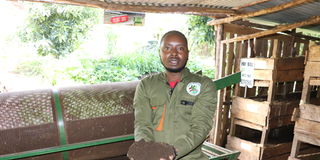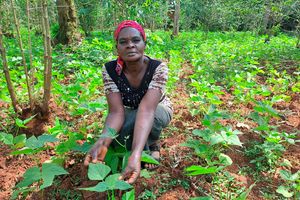Wealth in worms: How George built a thriving organic fertiliser business

George Kamau displays processed vermicompost.
What you need to know:
- Raw cow dung is mixed with organic materials, including kitchen waste, dry leaves, or grass, in units of wooden trays/beds, forming a complete menu for earthworms.
Six years ago after George Kamau failed to secure a stable income as a casual construction worker in Nairobi, he turned to the internet for alternative opportunities.
That’s when the resident of Kagaa village in Lari, Kiambu County discovered vermicomposting—a natural process where earthworms decompose organic waste into rich fertiliser. Today, he is the proud owner of a thriving earthworm-powered organic fertiliser factory producing 320 bags (50kg each) of nutrient-rich biofertiliser (vermicompost) monthly— whose farm-gate price is Sh2,500 per bag.

“This is a technique I learned from watching YouTube videos and other internet content,” said the 30-year-old entrepreneur, who did not pursue his education beyond secondary school due to financial difficulties.
“This has not only become a substantive source of income for me, but a blessing for vegetable farmers in this community, who are eager to embrace agroecology - a farming approach that integrates ecological principles with agricultural practices - for sustainable food production.”
Vermicompost is a product of earthworm digestion and aerobic decomposition of organic material to produce a rich organic soil amendment containing a diversity of plant nutrients and beneficial microorganisms.
George mixes raw cow dung with organic materials, including kitchen waste, dry leaves, or grass, in units of wooden trays/beds, forming a complete menu for earthworms. A handful of worms are then introduced and the beds covered with dry banana leaves, which are added occasionally as the worms consume older leaves.
Worm poop
The worms begin to enjoy the delicious meal, thereby ingesting and digesting the organic matter while excreting it as castings (worm poop), which are rich in nutrients and microbes that are beneficial to soil health and plant nutrients. In the process, the worms lay eggs and reproduce frequently. Within two months, the beds are ready for harvest, where the worms and their eggs are separated from the vermicompost using a manually operated rotary drum sieve.
“There is a growing demand for vermicompost fertiliser in this region as many farmers are moving away from synthetic fertilisers to organic farming as a way of addressing food deficiencies in a sustainable way,” said George.
He noted that one acre of land requires four to six 50kg bags of the biofertiliser for crops like maize, beans and vegetables. “The more you apply it, the more it continues to build the soil, and after a long run, you may just plant without using any fertiliser because the soil will be manufacturing its own nutrients,” he said.
To sustain monthly production for his current scale of 278 beds requiring five kilogrammes of organic matter per bed, the entrepreneur buys at least 20 tonnes of raw cow dung from dairy farmers in Githunguri every month.
Beyond local farmers who throng his homestead almost daily to buy the vermicompost, his entrepreneurship has attracted the attention of local and international organisations, who are using his skills for further capacity building, and for research.
SNV, through a project known as ‘Veggies for Planet and People’ that aims to improve environmental and human health through organic production of vegetables while improving incomes for youth and women in the vegetable sector is one of international organisations that have gotten George’s attention.
According to Ian Kamau, field officer and agribusiness consultant at SNV in Central Kenya, George has become an important resource for coaching farmers in sustainable agriculture, especially women and youth, across the country. “We use him to train trainers, and in return, we link farmers who need the vermincompost to him,” he said.
“Our main aim is introduce sustainable methods and inputs like vermicompost to create jobs and income, particularly for youths and women in the vegetable sector, and improve environmental and human health through agroecological practices,” added Mr Kamau.
According to an article appearing on the ScienceDirect platform, vermicompost is a good source of nutrients, much better as compared to Farm yard Manure, and can be safely used in organic farming for sustainable food production.
The article finds that vermicompost is a rich source of all essential plant nutrients, with the nutrient content of well-rotten vermicompost ranging from 1.2 to 2.5 per cent nitrogen, 0.9 to 1.7 per cent phosphorus and 1.5 to 2.5 per cent potassium, providing excellent effect on overall plant growth, thereby encouraging the growth of new shoots and leaves, and improving the quality and shelf life of the produce.
Beyond the crop nutritional value, scientists have found that vermicompost improves soil structure, aeration, and water holding capacity. It also prevents soil erosion, and is rich in beneficial micro flora such as a fixer, P-solubilize (beneficial bacteria capable of solubilising inorganic phosphorus from insoluble compounds), cellulose decomposing micro-flora (the collection of microorganisms, including bacteria and fungi, that have the ability to break down cellulose, which is a complex carbohydrate found in plant cell walls), among others.
Another study by scientists from the University of Guyana finds that vermicompost is an excellent organic medium that can be used to cultivate vegetable crops in comparison to chemical fertilisers. This is because growing crops with vermicompost improves plant health with a positive influence on the yield and growth parameters of many plants. The study has as well found that the biofertiliser has a high nutrient content, has pesticidal properties and slowly releases nutrients compared to the chemical fertilisers, which get depleted faster.
George’s next goal? Scaling up production.
“I sleep and wake up thinking about worms,” he laughs. “Who knew these tiny creatures would change my life?”


